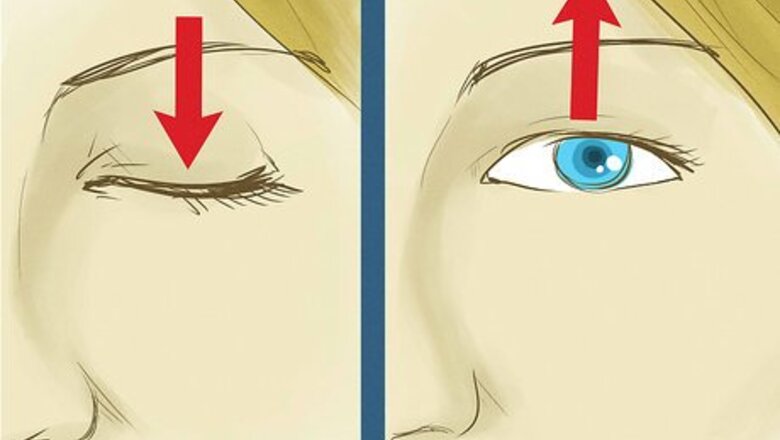
views
Removing Something on Your Own
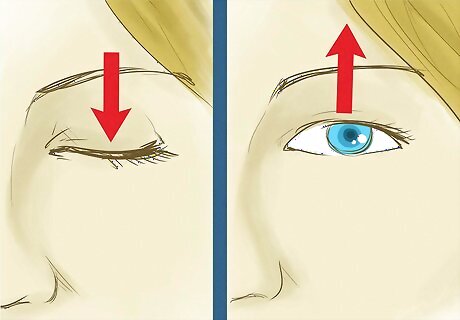
Blink your eyes rapidly. When you get dust, hair, or another small foreign body stuck in your eye, your body’s natural response is to blink. Blinking rapidly may help move the debris, and allow any tears that may form to clear it out. The more you blink and get yourself to tear up, the better chance you have of removing the particle. To blink, rapidly open and close your eye. Although you may feel silly, the tears may naturally wash out the debris. If you cannot focus enough to get yourself to fake cry, then you can also try yawning to produce tears.
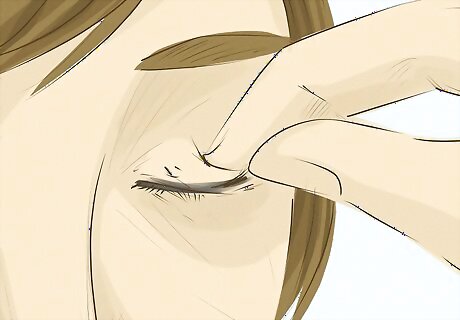
Place your upper eyelid over your lower eyelid. If you’re attempting to remove something stuck beneath your eyelid, close the affected eye and gently pinch the skin of your upper eyelid. Pull the upper eyelid down slightly over the lower one. Roll your affected eye around in its socket. With luck, this motion will loosen and dislodge something in your eye.
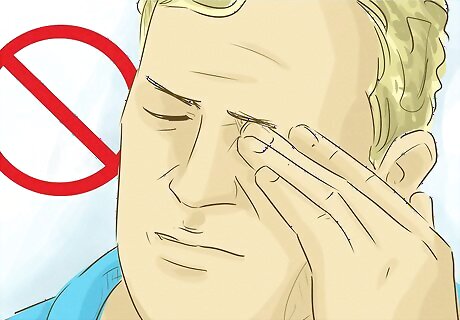
Avoid rubbing your eyes. It is instinctual to rub your eye when something has gotten into it, but this can actually be quite dangerous. If you rub your eye, the trapped particle might be pushed beneath your eyelid, puncture your eye, or scratch your cornea, known as corneal abrasion. If this occurs, you could suffer permanent eye damage, up to and including blindness, along with a lot of pain. Therefore, do not apply pressure or rub your eyes when removing something from your eye.
Removing Something With Assistance
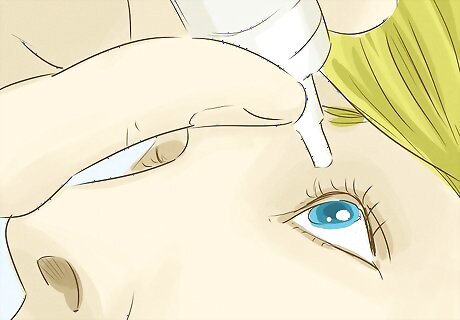
Wash the eye with eye solution. Commercially available eye wash solutions are useful for dislodging something from your eye. Eye wash solutions differ in their application process. Some use indirect application by filling a small eye cup with solution, then covering your eye with the eye cup and tilting your head back. Other solutions use a direct method, in which you tilt your head back, then drip or squirt solution directly from the bottle and into your eye. EXPERT TIP Sarah Gehrke, RN, MS Sarah Gehrke, RN, MS Registered Nurse Sarah Gehrke is a Registered Nurse and Licensed Massage Therapist in Texas. Sarah has over 10 years of experience teaching and practicing phlebotomy and intravenous (IV) therapy using physical, psychological, and emotional support. She received her Massage Therapist License from the Amarillo Massage Therapy Institute in 2008 and a M.S. in Nursing from the University of Phoenix in 2013. Sarah Gehrke, RN, MS Sarah Gehrke, RN, MS Registered Nurse Sarah Gehrke, a Registered Nurse, recommends: "If you work with chemicals or irritants, be sure to understand how to use your emergency eyewash station before an injury occurs."
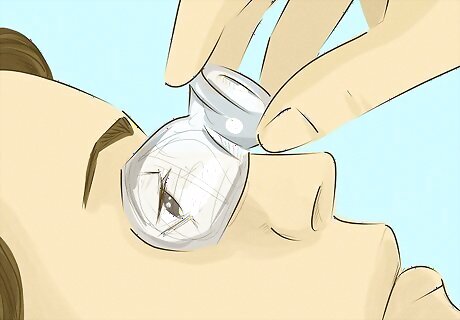
Rinse your eyes with water. If you have an eye cup (used for rinsing eyes), use that to wash out your eyes with cool, clean water. Otherwise, use a small bowl or cup full of water and splash the water into your open eye. You can also place your open eye under a gently-pouring faucet or shower to rinse it out.
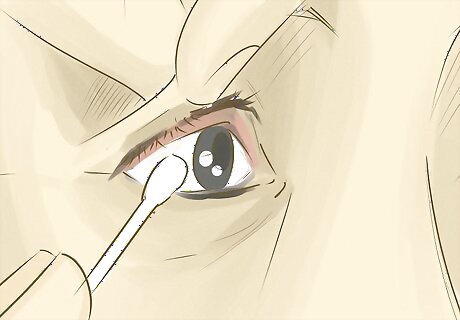
Place a cotton swab or corner of a clean cloth behind the upper eyelid. Gently pinch your upper eyelid and lift it up slightly from the eye. Slip the cotton swab or corner of a clean cloth gently behind the eyelid and slowly roll your eye toward the back of your head. Remove the swab or cloth and check to see if you still feel something in your eye. If you’re unsure, which may occur if your eye is still red or irritated after the removal of the object, you could also check the surface of the cotton swab or cloth for something foreign.
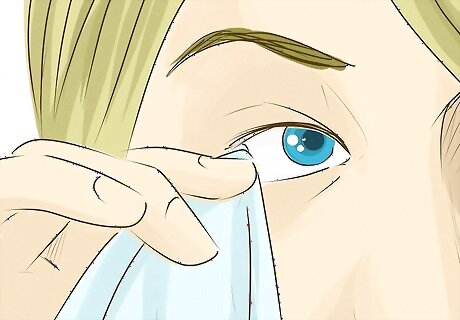
Use a cotton swab or corner of a clean cloth to remove the object. If, after rinsing your eye with solution and/or water, you can still feel something in your eye, use a cotton swab or clean cloth to get it out. Always wipe in a gentle up or down motion, and never swipe across the eye. To protect your cornea, look in the direction opposite the place where something is lodged in your eye. For instance, if something is in the right side of your eye, look toward the left. Check the cotton swab or cloth after each attempt at removal. If your cotton swab or cloth was white, you should be able to see it on the cotton swab or cloth after it’s been removed.
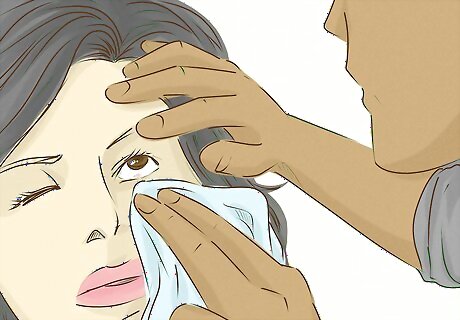
Have a friend help you. If you’re having difficulty getting the particle out of your eye and can’t see it in a mirror, you should turn to a friend for help. Hold your eyelids open and allow your friend to check for the presence of something. Move your eye around so your friend can see its entire surface. If you are comfortable with it, you may want to have them use a cotton swab to dab the offending object out of your eye. Alternatively, you may invite them to administer eye drops or a cup of water to flush the eye.
Removing Large/Dangerous Objects
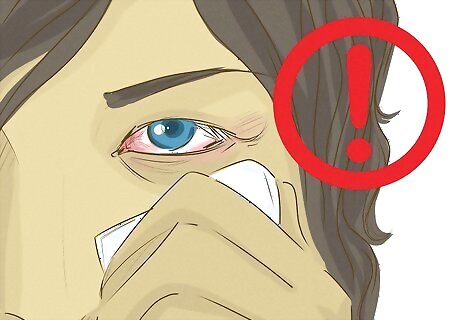
Identify symptoms indicating you need medical care. If your eye is irritated by anything larger than a small speck, you may need a doctor to help you remove it. If the item is very large, or has punctured the eye to the point of bleeding and severe pain, this is a virtual guarantee. Pain is the most obvious sign that something in your eye is more than a mild irritant, though sometimes something in your eye can cause serious damage even in the absence of pain. Other symptoms to watch for include visible changes to the color of the eye, bleeding, abnormal, blurred, or absent vision, or discharge from the eye. If you cannot dislodge the foreign body from your eye, you should also consider this cause to see a medical professional.
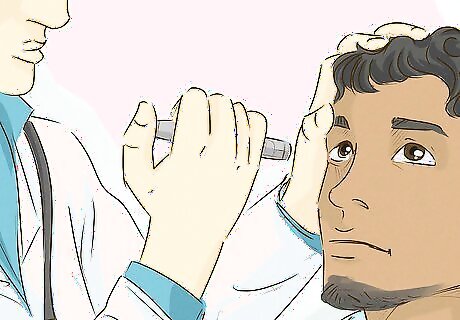
Seek medical attention. Once you’ve identified something in your eye as a serious issue, contact a doctor. Larger foreign bodies, like shards of glass, butter knives, or nails, must be removed by a doctor or medical professional. If the item is stuck inside of the eye, minor surgery may be required to remove it. Otherwise, the doctor may numb your eye and pull out the object, giving you an eye patch to protect it afterwards as it heals. You may also be given antibiotics.
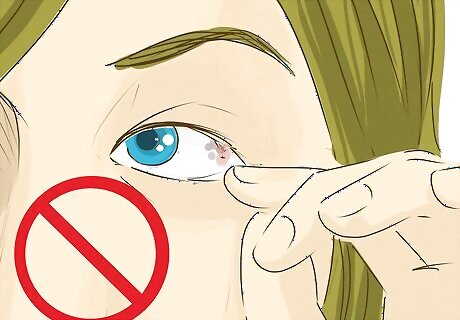
Do not attempt to remove objects embedded in the eye. If you have a shard of glass, butter knife, or something else that has punctured your eye, avoid attempts to remove it yourself. You will most likely do even more damage in your attempt at removal. Instead, get to a doctor for proper, safer medical aid. Carefully cover the eye with an eye patch until you see a doctor.












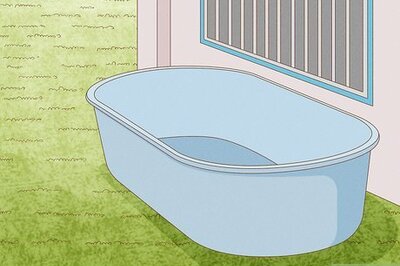




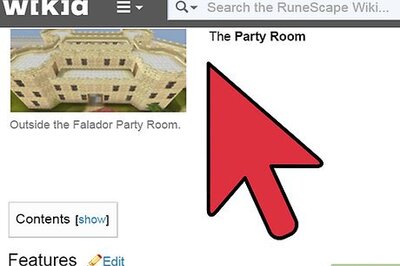


Comments
0 comment